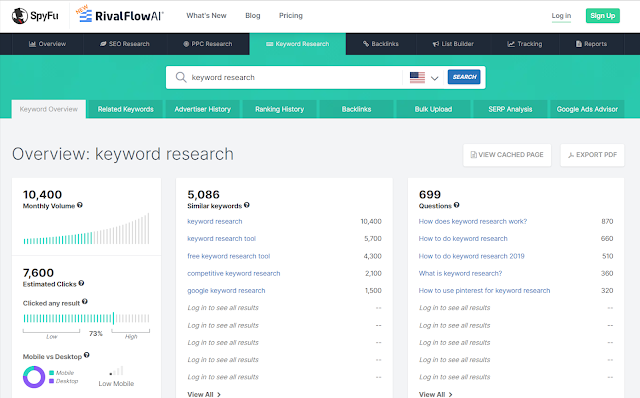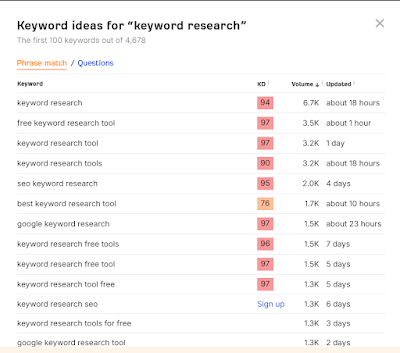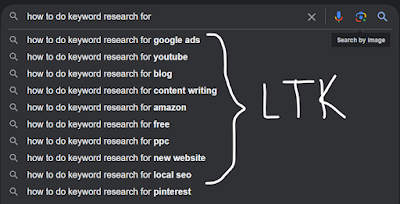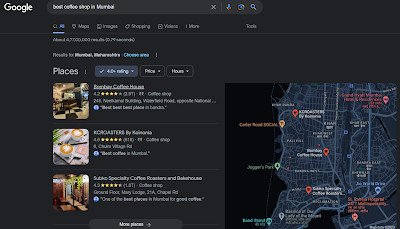SEO Keyword Research Guide
In the vast digital landscape, the key to unlocking your website's potential lies in mastering the art of keyword research. If you're a beginner, marketer, or a small business owner eager to boost your online presence, you've come to the right place. Let's delve into the world of SEO without the confusing jargon and complex terms. We'll explore the ins and outs of "How to do keyword research" and equip you with the tools to elevate your website's visibility.
 |
| How to do keyword research |
1. Understanding the Basics
What are Keywords?
Keywords: At the heart of SEO lies the keyword. These are the terms or phrases users type into search engines. To understand the basics, think of keywords as the language bridge between your content and what users are actively seeking. For example, if you have a blog about pet care, relevant keywords could be "best dog food" or "cat grooming tips."
Keywords are the magic words people type into search engines. They're the bridge between what users are looking for and what your website offers. Think of them as the secret codes that unlock the doors to your content.
Why is Keyword Research Important?
Imagine having a treasure map without knowing where "X" marks the spot. Keyword research is your map; it helps you understand what your audience is searching for, ensuring you provide the content they seek. It's not just about traffic; it's about attracting the right kind of treasure—your target audience.
What is the primary purpose of keyword research?
Keyword research helps you understand what your audience is searching for, enabling you to tailor your content and improve your website's visibility. This, in turn, boosts your chances of reaching and engaging your target audience.
Getting Started with Keyword Research
Keyword Intent
First things first, understand why someone is searching. Are they looking for information, wanting to buy something, or seeking specific details? Knowing the intent behind the keyword helps you tailor your content accordingly.
Monthly Search Volume (MSV)
Numbers speak louder than words. MSV tells you how many times a keyword is searched each month. Aim for the sweet spot—keywords with enough searches to matter but not so much competition that you get lost in the shuffle.
You can use any tools like SEMRush, Ahref, Google Keyword planner or chrome extensions like SurferSEO and Whatsmyserp
Suggested tool - Use Ahrefs Free Keyword Generator tool
Topical Authority
Think of your website as a knowledgeable friend. Topical authority means becoming the go-to source for specific topics. It builds trust and credibility, key ingredients for a successful online presence.
How to Conduct Keyword Research
1. Make a List of Broad Topics Relevant to Your Niche
Start broad. If you're a fitness enthusiast, your topics might include "weight loss," "muscle gain," or "healthy recipes."
2. Expand Each Topic with Phrases Your Customers Use
Get into the minds of your audience. What phrases might they use? If "weight loss" is a topic, phrases could include "lose belly fat" or "effective diet plans."
3. Find Related Search Terms
Explore the possibilities. Use tools like Google's Autocomplete or "People also ask" to discover related terms you might have missed.
Suggested tool - Use Google search engine autosuggests
4. Analyze the Strength of Your Keywords
It's a bit like sizing up your competition. Tools like Ahrefs or Moz can help you understand the competition for your chosen keywords.
5. Determine How You Rank in Your Industry
Are you a David in a field of Goliaths? Know where you stand. Analyze your current rankings and identify opportunities for growth.
6. Verify Search Intent
Ask yourself: Does your content align with what users are looking for? If someone searches for "best running shoes," they probably want recommendations, not a history of shoes
Check out these list of paid and free keyword research tools for more information.
2. The Significance of Long-Tail Keywords
Long-Tail Keywords: Imagine casting a wide net in a sea of information versus using a specific tool to catch exactly what you need. Long-tail keywords are like that specific tool. They are longer, more detailed phrases that often have less competition. For instance, instead of targeting "shoes," opt for "comfortable running shoes for beginners."3. Unveiling User Intent
User Intent: Delving into user intent is like becoming a mind reader. It involves understanding why users are searching for specific keywords. If someone searches for "best budget smartphones," their intent is likely to make a purchase decision. Align your content with this intent to provide valuable information and, potentially, influence their decision.
4. Tools of the Trade: Keyword Research Tools
Keyword Research Tools: Think of these tools as your SEO companions, aiding you on your quest for the perfect keywords. Google Keyword Planner, for instance, offers insights into search volumes and competition.
SEMrush goes a step further, providing competitor analysis and trend tracking.
5. Crafting SEO-Friendly Content
SEO-Friendly Content: Now that you have your keywords, it's time to weave them seamlessly into your content. Imagine your content as a road trip, and your keywords are the signposts guiding both readers and search engines.
Ensure a natural flow by incorporating keywords where they fit organically.
6. Analyzing Competitor Keywords
Competitor Keywords: Picture yourself as a detective, uncovering the strategies of your competitors. Tools like Ahrefs or SpyFu allow you to identify the keywords your competitors are ranking for. This insight is invaluable for refining your own keyword strategy.
 |
| Spyfu |
7. Navigating Local SEO
Local SEO: Envision your business as a beacon in a local neighborhood. Local SEO ensures that your business is visible when people nearby search for relevant products or services. This involves optimizing your content for location-specific keywords, such as "best coffee shop in [your city]."
8. The Dynamic Nature of Keywords
Dynamic Nature of Keywords: Keywords are not stagnant; they evolve. Think of them as a language that adapts over time. Regularly update your keyword list to stay relevant. For example, the rise of electric cars may shift keyword trends from "fuel-efficient cars" to "best electric vehicles."
9. Balancing High and Low Competition Keywords
Balancing Keyword Competition: Striking a balance is like walking a tightrope. Aim for a mix of highly competitive keywords that bring substantial traffic and low competition keywords for quicker wins. For instance, targeting "affordable web design" alongside "best web design practices."
10. Evolving Trends in SEO
Evolving Trends in SEO: Picture SEO as a dynamic landscape with trends shifting like sand dunes. Stay updated by reading industry blogs, attending webinars, and adapting to changes in search engine algorithms. The evolution could involve the rise of voice search, influencing your keyword strategy.
11. Mobile Optimization and Keywords
Mobile Optimization: Imagine your audience on the move, searching for information on their phones. Optimize your keywords for mobile searches by ensuring your website is mobile-friendly. For example, focus on concise and easily readable content, catering to the mobile user experience.
12. Tracking and Adjusting Strategies
Tracking and Adjusting Strategies: Imagine your keyword strategy as a sailing voyage. Regularly check the weather (analytics) to ensure smooth sailing. Tools like Google Analytics act as your compass, helping you track keyword performance and adjust your strategy accordingly.
13. The Role of Social Media in Keyword Research
Social Media in Keyword Research: Visualize social media platforms as bustling marketplaces. Engage with your audience on platforms like Instagram, Twitter, or Facebook to understand their discussions. Social signals from these platforms can positively influence your website's SEO.
14. Mastering Google Analytics
Google Analytics: Think of Google Analytics as your SEO report card. It provides detailed insights into how users interact with your website. Analyze which keywords drive traffic, and use this information to refine your content and SEO strategy.
Final thoughts:
Congratulations! You've navigated the intricate world of keyword research. Remember, SEO is an ongoing process, and staying informed is key. Now armed with this knowledge, go ahead and elevate your online presence.
Step-by-Step Guide: Imagine crafting your SEO strategy as assembling a puzzle. Begin with understanding your audience and business goals. Then, progressively integrate the insights gained from each heading in this guide. The final picture is a comprehensive keyword strategy tailored to your unique needs.
Keyword Research FAQs
Are long-tail keywords really necessary?
Absolutely! Long-tail keywords are often less competitive and attract more targeted traffic. For example, if you're a bakery, targeting "best chocolate cake recipe for beginners" is more specific and likely to attract users genuinely interested in baking, leading to higher conversion ratesHow Do I Get Good at Keyword Research?
Practice makes perfect. Stay curious, explore new tools, and keep an eye on industry trends. The more you immerse yourself, the better you'll get.
How Can I Do Free Keyword Research?
Luckily, you don't need a treasure chest of gold to start. Use free tools like Google Keyword Planner, Google Trends, or explore the search features on various platforms.
How Can I Maintain Keyword Rankings?
Think of it as tending to a garden. Regularly check your rankings, update your content, and adapt to changes in your industry. Consistency is key to maintaining your SEO success.






